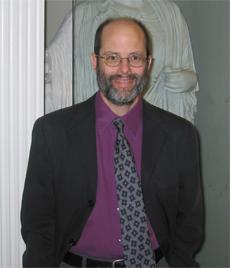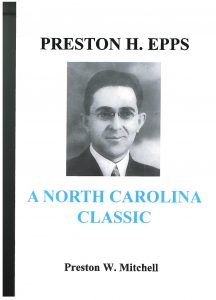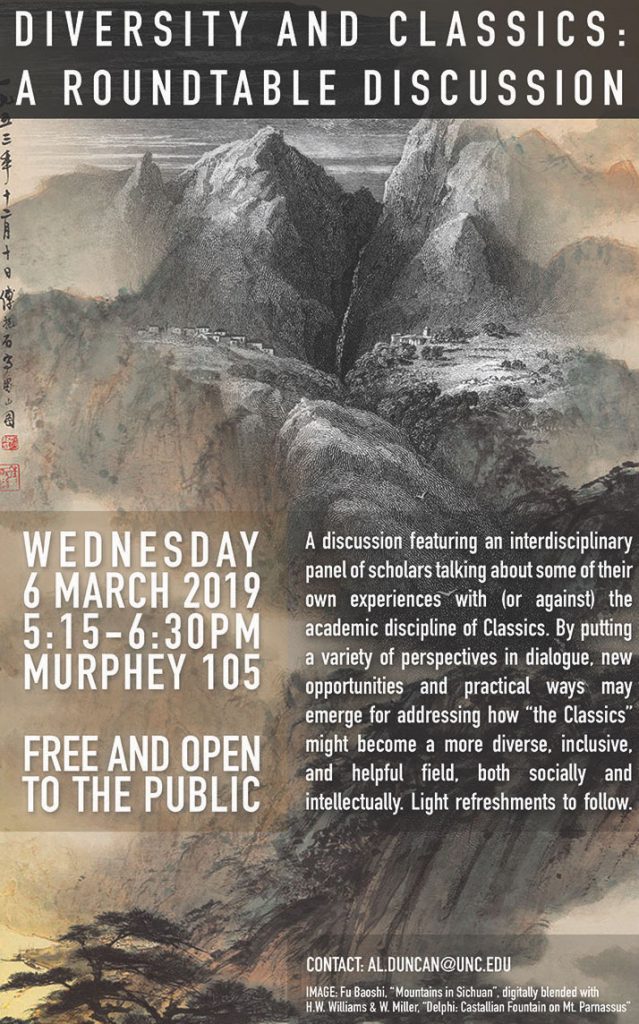Letter from the Chair
To say that this has been a challenging year would be something of an understatement. The fall semester began and ended with turmoil over the Confederate Monument, aka Silent Sam, with two hurricanes, a water main break, and a snowstorm in between. Although the spring semester was less turbulent atmospherically, conditions on campus remained stormy: the Chancellor’s decision to remove Silent Sam’s pedestal from campus was immediately followed by the Board of Governors’ decision to remove her from office within two weeks. This in turn led to a cascade of vacancies: in addition to an Interim President of the state university system, we now have an Interim Chancellor of the University, an Interim Dean of the College, and an Interim Senior Associate Dean of Fine Arts and Humanities. Thus far, I am relieved to say, the Department has weathered these storms with relatively little damage, although we are gearing up for our own transitions: among other changes that I will discuss below, next year will be my last as Department Chair.
Change, however, has as always been ongoing. One of the most significant changes of this year is that we welcomed our most recent addition to our faculty, Suzanne Lye. Since Suzanne introduces herself elsewhere in this newsletter, I will simply say how delighted we are that she has joined us. In other good news, Jennifer Gates-Foster has officially been awarded promotion to Associate Professor with tenure. In the years since she joined our faculty Jen has become an indispensable member of our department, and I am glad that we can look forward to working with her for many years to come. Although we are still in need of additional colleagues, especially in classical Greek archaeology and Latin prose, I am in hopes that we now have in place a stable core of faculty and can focus our collective energies on other types of changes.
The most significant of those already underway are taking place in our graduate program. My colleagues and I have been working hard to rethink and revise our graduate degree tracks, something that we have been discussing for several years now and began in earnest last year. Our current structures have served us well, but apart from some small-scale revisions they have remained largely unchanged for some twenty years or more. Our goal in this process has been to maintain our traditional strengths while updating specifics, increasing options, and clarifying expectations. To this end, the archaeologists have completely restructured their graduate exams and made changes to the course requirements. On the philology side, we have replaced the separate MA tracks in Greek and Latin with a single track in Classics, both Greek and Latin. As part of that process we carefully thought through the expected outcomes of the MA program, keeping in mind that its primary function is to ensure that our students have a solid foundation before moving on to the PhD track but that it must also provide a coherent set of skills for students who leave after the MA and pursue other options. We also systematically updated our reading lists, adding new lists of works to be read in English as well as recommended commentaries, and devised a new structure of the MA exam in literature. Our Mebane Library Fund allowed us to supplement our holdings in the Ullman Library to make sure that it contains all the books that our students need to prepare for the new reading list and exams. Those of you who are interested can find the new reading lists here and a description of the new MA exam structure here. Still to come are changes to the PhD track, which we hope to finalize next year.
Although our focus has been on the graduate program, we are by no means ignoring the undergraduate program. New courses that were submitted and approved this year include one on Achaemenid Persia, to be taught by Jennifer Gates-Foster (CLAR/ARTH 382); one on race and ethnicity in the ancient Mediterranean, developed by Jennifer Gates-Foster, Suzanne Lye, and Patricia Rosenmeyer (CLAS 243); and a course on Augustine’s Confessions developed by Bob Babcock as an alternative to our longstanding third-year course on Cicero (LATN 224). Apart from new courses and some minor tweaks, however, we deliberately delayed embarking on any substantive revisions to our undergraduate program while we awaited the final version of the College’s new general education curriculum, IDEAs in Action, which has been in development for several years. Since it has now been formally approved and will come into effect in Fall 2021, we are starting the process of adapting our current course offerings to meet the requirements of the new curriculum.
As all students of the past are aware, of course, we rarely find change without some degree of continuity. One of our accomplishments over the past year was a complete overhaul of our website, which now has a new look and a new navigational structure. Many thanks to our department secretary, L.E. Alexander, and our work-study office assistant, Rachel Wock, for all their hard work on this! Although much of the content remains the same, there are several new features that are likely to interest readers of Tabulae. One of these is George Houston’s ‘Why I Love Murphey Hall’, which is neither a history nor a memoir but rather a description, as he subtitles it, of ‘An American Academic Department in the Late Twentieth Century’. Anyone who, like George, loves Murphey Hall will find it fascinating, as will no doubt a range of more casual readers as well. The Departmental History has a new look, and several of the mini-biographies of former faculty members, now accessible via a menu on the left of the page, have been revised and expanded, notably those of Preston Epps, Henry and Sally Immerwahr, Kenneth Reckford, Ed Brown, and George Kennedy. I owe thanks to colleagues and family members for their assistance with this project, and must single out Preston Mitchell, Professor Epps’ grandson, some of whose research for his biography of his grandfather I incorporated into our website entry. (Those interested in purchasing a copy of Preston H. Epps: A North Carolina Classic, should contact Mr. Mitchell directly at pwm2q@uvawise.edu). We have also created a new page listing all current and former winners of departmental prizes, arranged in chronological order by date of the award’s establishment; winners of the Eben Alexander Prize in Greek date back to 1887! Lastly, we have created an overview of departmental funds, so that potential donors will be able to direct their gifts more easily either to specific areas or, if they prefer, to funds in honor of former members of the department.
It is thanks to gifts from our generous benefactors that can provide our undergraduate students with such a wonderful range of educational opportunities. Last summer, for example, Alex Haggis was able to spend several months in Athens working with the award-winning poet A. E. Stallings on translating both ancient and modern Greek poetry, and Ashley Choo-Hen conducted research in Guyana on the teaching of Latin and classics in a post-colonial context. Megan Abernathy, Catherine Atkinson, and Shawna Milam all took part in Jodi Magness’ field project at Huqoq in Israel; Grace Miller did the intensive Latin program at Berkeley; and Allison Ruvidich participated in the College Year in Athens summer program. The excellence of our undergraduates continues to be recognized in a range of ways. Four of our eleven graduating majors earned Highest Honors for senior theses on an impressively wide range of topics: Jermaine Bryant on civil war in the poems of Propertius (under Sharon James), Jack Gray on the Corcyrean civil war in Thucydides (Emily Baragwanath), Alex Haggis on Hellenistic amatory epigrams (Patricia Rosenmeyer), and Esther Lee on environmental health perspectives in the ancient world (Janet Downie). In addition, two of our majors, Grace Miller and Olivia Zitkus, won Manson A. Stewart Undergraduate Awards, given by the Classical Association of the Middle West and South. You can read about them, along with all the winners of departmental prizes, here. Last but not least, Jermaine Bryant was the only undergraduate to win one of the University’s Diversity Awards for 2019.
Our students, we are glad to see, continue to make their mark after they have graduated from our program. Next academic year, two of our formers students will hold research fellowships at the Center of Hellenic Studies in Washington, DC: Aileen Das (BA 2008, currently Assistant Professor of Classical and Mediterranean Studies at the University of Michigan) and Erika Weiberg (PhD 2016, currently Assistant Professor of Classics at Florida State University). Susan Meyer (BA ’09), now a Latin teacher at Culbreth Middle School in Chapel Hill, was one of this year’s winners of the Society for Classical Studies Awards for Excellence in Teaching at the Procollegiate Level; see our interview with Susan elsewhere in this newsletter. Lastly, Sam Moorhead, currently the National Finds Adviser for Iron Age and Roman Coins at the British Museum, has been awarded the Royal Numismatic Society’s 2019 Medal for his many achievements in the fields of numismatics, archaeology, and history. If you haven’t yet looked at our website page featuring some of our undergraduate alumni, you might find it interesting. If you’re interested in contributing to it, please let us know: we’d love to include you!
Despite the achievements of our undergraduates and the excellence of our program, however, it is an ongoing challenge to reach undergraduates who may be interested in our offerings. I am accordingly very pleased that the department is now able to benefit in a more systematic way from the creative ideas and energy of our grad students, thanks to the generosity of Amanda and Mal Watlington. This year’s inaugural Watlington Fellow for Undergraduate Outreach, Hannah Sorscher, got the position off to a great start by designing a banner for the department to use at outreach and promotion events. She also oversaw the production of the first official department swag: 250 cups which, filled with departmental pamphlets and information sheets, she and her colleagues handed out to undergraduates at this year’s FallFest.
Hannah’s work as the Watlington Fellow is just one example of what our grad students are able to accomplish despite being hampered by funding packages that over the years have grown increasingly inadequate. Kelly McArdle, for example, has invested significant amounts of time and energy into the protests against Silent Sam. Although some may think that this has nothing to do with Classics, Kelly herself has made cogent arguments to the contrary. You can read some of her most recent thoughts on this topic in a piece she published in Eidolon. The misuse of the classical tradition to support racism and white supremacy is something that we, like our colleagues across the country, continue to struggle with. The faculty issued a statement condemning these kinds of appropriations and are engaged in ongoing discussions as to how we can work towards positive change. The highlight of these discussions during the past year was a roundtable organized by Al Duncan, our College Diversity Liaison, on ‘Diversity and Classics’, featuring colleagues from the departments of African, African-American and Diaspora Studies, Asian Studies, English and Comparative Literature, and Religious Studies. Attended by some twenty-five faculty members, grad students, and undergraduates, the roundtable generated some excellent discussion that continued long after the event’s official end-time.
Our graduate students are integral to the success of our program, and we are grateful to the donors who allow us to supplement their stipends with top-ups and travel awards. You can see from the list of presentations at conferences that they put these funds to good use. They also make us proud by their ability to win highly competitive external awards. Katie Tardio won a Dissertation Fieldwork Grant from the Wenner-Gren Foundation for her zooarchaeological research in Spain in Fall 2019. Cicek Beeby was awarded a one-year visiting research fellowship at the Institute for the Study of the Ancient World in New York for 2019-20. Matt Schueller will spend next year in Los Angeles as winner of the Getty Villa Predoctoral Fellowship. Melanie Godsey has been awarded the Schliemann Fellowship at the American School of Classical Studies in Athens and will be in residence there next year as a regular member; Sarah Hilker will also be there on a Fulbright. It is a marker of the excellence of our track in Classical Archaeology that we have had graduate student fellows at the ASCSA every year since 2013! Our archaeologists, however, do not have a monopoly on these achievements: Brian McPhee will spend next year doing dissertation research at the American Academy in Rome on the Ross Arthur Rome Prize.
We are delighted that our graduate students have these opportunities to live and work across North America and Europe. Classics has always been an international field, and globalization has made it even more so. Murphey Hall itself has had a distinctly international feel this year, thanks to a number of visitors from European institutions. In addition to our visiting speakers, which this year included guests from Canada, the UK, and the Netherlands, we also enjoyed several longer-term visits. In August, Julie Marchand, an archaeologist at the Université Lumière Lyon 2 and a colleague of Jennifer Gates-Foster in the major European Research Council project ‘Desert Networks’, spent three weeks in residence working with Jen and helped us kick off the new academic year with a presentation on her research. She was immediately followed by two colleagues from the Department of Classics at King’s College London, Lindsay Allan and Daniel Orrells, who led two intensive week-long graduate seminars on ‘Assyriology and Classics’ and ‘German Idealism and Its Discontents: An Introduction to Classical Reception Studies’ respectively, providing our graduate students with an invaluable opportunity to explore new areas and perspectives. They also delivered the joint keynote lecture for our annual KCL-UNC Graduate Colloquium, this year on the theme ‘Gendered Readings: Methodologies in Classics’. Last but certainly not least, Markus Hafner, of Ruprecht-Karls-Universität Heidelberg, was with us for most of the year, from September 2018 through early June 2019, on a Feodor Lynen Research Fellowship awarded by the Alexander von Humboldt Foundation; see further here. Emily Baragwanath, herself a former Humboldt fellow, served as his official host. In addition to the department’s ongoing international connections, we are also in the beginning stages of establishing a new partnership with the Philologisches Seminar of the Eberhard Karls Universität Tübingen, spearheaded by Patricia Rosenmeyer. We were delighted in April to host a visit by our first Tübingen guest, Wolfgang Polleichtner, and we are looking forward to larger-scale exchanges in the future.

In closing, I must thank all the people who have contributed to our ongoing success. First and foremost are my faculty colleagues in the department, who constantly go above and beyond duty in their dedication to our students and our collective enterprise. I am grateful as well for the support of our former Senior Associate Dean and now Interim Dean, Terry Rhodes, and former Dean and now Interim Chancellor, Kevin Guskiewicz, who continue to be stalwart advocates of the liberal arts. I must also thank our new Interim Senior Associate Dean, Elizabeth Engelhardt, with whom I look forward to working further. Our students, of course, are our fundamental raison d’être, and they are essential to our success not only through their excellence as students but, as should be clear from my letter, for their many contributions to the life of the department. As always, the true sine qua non is our office staff, Cinnamon Weaver, Kim Miles, and L.E. Alexander, who keep us all in line and make sure that things get done correctly and on time. I must thank L.E. in particular, since she is the person primarily responsible for this issue of Tabulae. Lastly, I am as always very grateful to our many friends and supporters from outside the department. It is thanks to their generosity that we have the resources we need to make good our potential. As the various reports both here and elsewhere in this newsletter make clear, we continue to do just that, and we are deeply appreciative to all those who enable our ongoing success.




